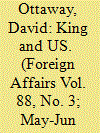|
|
|
Sort Order |
|
|
|
Items / Page
|
|
|
|
|
|
|
| Srl | Item |
| 1 |
ID:
130475


|
|
|
|
|
| Publication |
2014.
|
| Summary/Abstract |
The surge of ethnic and sectarian strife in Syria and across the Middle East has led a number of analysts to predict the coming breakup of many Arab states. This potential upending of the region's territorial order has come to be known as "the end of Sykes-Picot," a reference to the secret 1916 Anglo-French agreement to divide up the Middle Eastern provinces of the Ottoman Empire into British and French zones of control. Because the European treaties that created new Arab states in the aftermath of World War I upheld the outlines of that agreement, Sykes-Picot became the convenient shorthand for the map that colonial powers imposed on the region, one that has remained essentially constant to the present day.
With bloodshed from Aleppo to Baghdad to Beirut, it is indeed tempting to predict the violent demise of Sykes-Picot. But although the worst fighting is spilling over borders and pushing some countries, such as Syria, toward fragmentation, there is another force crossing national lines and even realigning national relationships: trade. New transnational zones of economic cooperation are making Middle Eastern borders more porous, but in a way that does not directly challenge existing states. Instead, mutual economic interests, especially in the oil and gas industries, may signal a softer end to Sykes-Picot.
|
|
|
|
|
|
|
|
|
|
|
|
|
|
|
|
| 2 |
ID:
089283


|
|
|
|
|
| Publication |
2009.
|
| Summary/Abstract |
As World War II was drawing to a close in February 1945, U.S. President Franklin Roosevelt and Saudi King Abdul Aziz ibn Saud met aboard a U.S. battleship in the Suez Canal for the first time. For nearly six decades afterward, the United States and the Kingdom of Saudi Arabia enjoyed an unusually close relationship. U.S. companies, which had discovered black gold in the Saudi desert in the early 1930s, built the kingdom into the world's leading petroleum exporter and a major source of oil for the U.S. market. The Saudis, in turn, made their territory and military facilities available to U.S. forces in order to assure U.S. protection of the House of Saud.
|
|
|
|
|
|
|
|
|
|
|
|
|
|
|
|
| 3 |
ID:
172026


|
|
|
|
|
| Summary/Abstract |
A second wave of uprisings broke out in Algeria, Sudan, Lebanon and Iraq during 2019 and gives no sign of abating. There is no doubt it will have important repercussions for the affected countries, just as the first wave did. The question is whether the outcome will be what the protesters would like or, as happened in the case of the first wave in 2011, the consequences will prove deeply disappointing and leave these countries mired in worse authoritarianism than before, even in chaos.
|
|
|
|
|
|
|
|
|
|
|
|
|
|
|
|
|
|
|
|
|